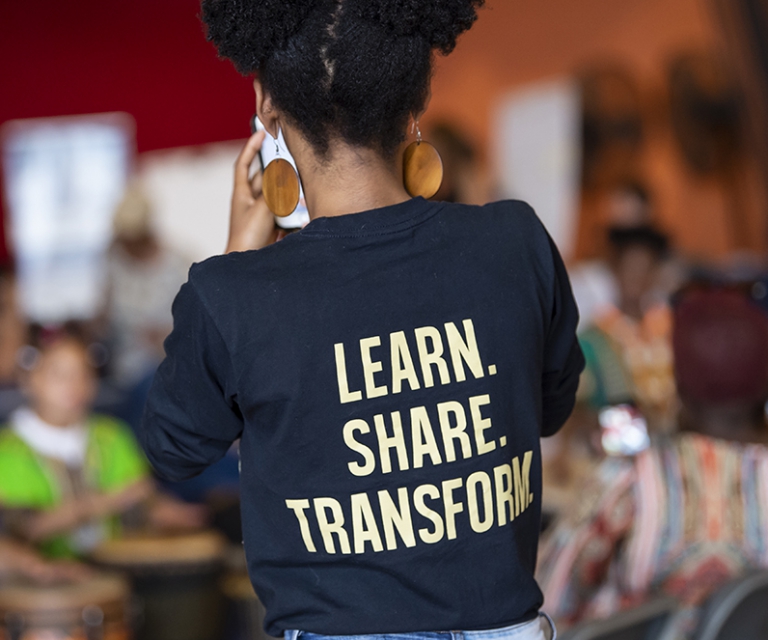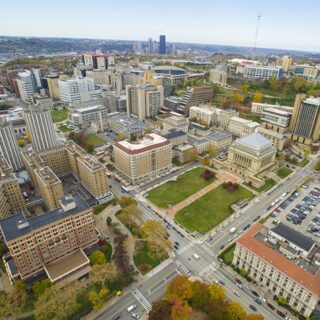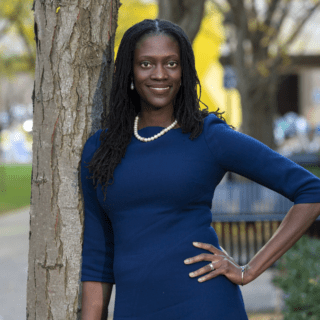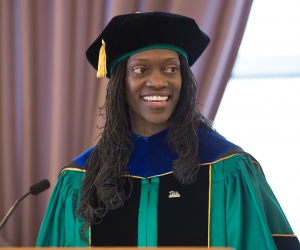
New PittEd Justice Collective Centers Equity and Justice in Education
When Valerie Kinloch, the Renée and Richard Goldman Dean of the University of Pittsburgh School of Education, heard about the death of George Floyd, a Black man who died while in police custody in Minneapolis on May 25, she felt angry, sad, and compelled to act.
The feelings were painfully familiar. His death reminded her of the death of Breonna Taylor in Kentucky, who was shot eight times in her home by police officers who had raided the wrong home. It reminded her of the murder of Ahmaud Arbery in Georgia, who was killed after a group of white men attacked him while he was jogging.
And it made her think of so many other Black lives taken too soon. They include Tanisha Anderson, Sandra Bland, Rekia Boyd, Philando Castile, Terence Crutcher, Oscar Grant, Freddie Gray, Botham Jean, Corey Jones, Trayvon Martin, and Walter Scott, among others. She recognized their deaths as mirroring the history of racial violence and white supremacy in the United States.
Kinloch wanted to make sure the Pitt School of Education, as an equity-minded institution, took action. So on June 1, she announced the creation of the PittEd Justice Collective. This three-year working group is responsible for advocating for equity and justice in education, while pursuing anti-racist initiatives within the school, throughout Pitt, and beyond the university.
“I knew we had to do something and it couldn’t be just a one-off effort. We needed to have a serious effort that would bring together different people who are committed to engaging in some really and important hard work,” said Kinloch.
Now, a month later, the PittEd Justice Collective is already making a significant impact.
The school’s faculty, staff, students, and alumni have stepped forward to join the effort—as have people from across the Pitt community. Membership is also growing to include families, youth, and school district and community leaders. Joining Kinloch in a leadership capacity with the PittEd Justice Collective is Elon Dancy, the director of the school’s Center for Urban Education and the Helen S. Faison Endowed Chair.
The PittEd Justice Collective has established a strategy and an agenda. In year one, it seeks to situate anti-racist practices at the center of the Pitt School of Education through a variety of educational events and programs, academic engagements with students, and collaborations with PK-16 educators, youth, and families.
The effort seeks foundational change by disrupting the structures that perpetuate racism and inequality.
“We are looking for an entire overhaul of the education system in this country, to be honest. We need to get away from talking about educational reform and should talk, instead, about abolitionist teaching,” said Kinloch.
Putting Equity and Justice Into Action
Kinloch sees the PittEd Justice Collective as an opportunity to put the ideas of the school’s mission-vision statement into action.
“It feels like it’s one of those initiatives that can actually bring all the parts together—our commitment to equity and justice, our efforts to innovate and agitate, to ignite learning, to teach, and to strive for well-being for all,” said Kinloch.
Among the PittEd Justice Collective’s first two engagement efforts is a Virtual Series on Justice and the creation of a white co-conspirators reading group.
The first three-part Virtual Series on Justice is part of the Transform for Tomorrow series for superintendents and school leaders. With the Grable Foundation, Remake Learning, and the Allegheny Intermediate Unit as partners, the PittEd Justice Collective will lead sessions on “Justice Learning and Leading,” “Justice Teaching in STEM,” and “Justice Listening and Strategizing,” on July 14, July 16, and July 21, respectively.
Also, the white co-conspirators reading groups will serve as forums for people to learn about, discuss, and collaborate on efforts in equity, justice, and anti-racism. The groups will be committed to engaging in meaningful educational activism. Although primarily for members of the Pitt School of Education, we welcome participation from others across the University and in the Community.
“The PittEd Justice Collective has the potential to transform our school’s operations, culture, climate, and academic experiences. It can also substantially impact what we study and read, how we teach and engage in research, and how we learn and lead,” said Kinloch.
Investing in Transformative Change
Since the PittEd Justice Collective was announced, Kinloch has received messages of support from over 130 people, including those as far away as Australia.
To Kinloch, their outreach demonstrates the significance of the group and the desire that people have to contribute to transformative change.
Since Floyd’s death, protests in support of the Black Lives Matter movement and calls for systematic police reforms have been ongoing across the country and world, including throughout the greater Pittsburgh region.
Kinloch plans on making sure that the Pitt School of Education is at the forefront of efforts to make justice-directed educational change.
The PittEd Justice Collective builds on the school’s commitment to equity and justice. The school has an Equity and Justice Committee made up of faculty, staff, and students that is charged with making the school more equitable, engaging, anti-racist, and humanizing. The school has an Equity and Justice Scholars Program that supports students to engage in critical, equity-centered research, teaching, and other professional engagements. Additionally, we have an ombudsperson who is charged with ensuring that our students remain at the center of our school and that they are supported to examine the role played by equity and justice in their learning experiences. Each year, the school engages in a School-wide Read with a justice-directed focus. For the 2020-2021 academic year, the school-wide Read will focus on the theme of anti-racism.
In future years, Kinloch envisions that the PittEd Justice Collective will broaden its focus to collaborate with partners across Pitt and in the community at large, and to disseminate studies on equity and justice. One hope that she has, depending on funding, is to eventually establish a center on equity, justice, and anti-racism that focuses on teaching, research, and engagement.
“This would be driven by our School in ways that benefit the entire University and the various Communities in our region and state. In fact, the work would advocate for anti-racist learning environments for students,” she said.
Learn More
For more information on the PittEd Justice Collective:
-
Contact PittEdJusticeCollective@pitt.edu for questions or to get involved
-
Visit the PittEd Justice Collective website to join the mailing list for updates
-
Register for the Virtual Series on Justice for school leaders on July 14, 16, 21, 2020
-
Indicate your interest in joining a white co-conspirators reading group




